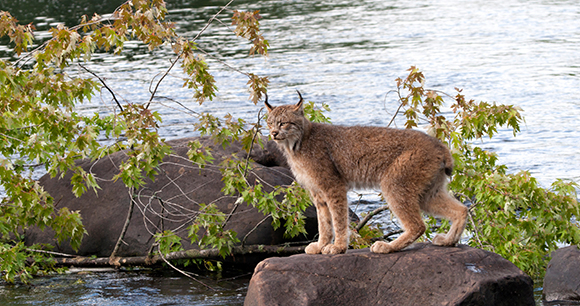
Denver, CO—Today, Colorado Gov. Jared Polis signed S.B. 25-168 into law to combat wildlife trafficking. The bipartisan legislation, which is unique among states for the number of species covered, establishes criminal penalties for selling, possessing, transporting, importing, or exporting threatened and endangered species found in Colorado, the United States, and globally. It also empowers Colorado Parks and Wildlife (CPW) to investigate the impacts of wildlife trafficking.
“The Animal Welfare Institute (AWI) has supported this legislation from the beginning, and we are thrilled that it is now law in Colorado,” said Lauren McCain, Ph.D., senior policy advisor for AWI’s Terrestrial Wildlife Program and a Colorado resident. “Wildlife trafficking is devastating to imperiled species in Colorado and around the world. It also poses a growing danger to people due to disease transmission and organized crime networks that are killing an unprecedented number of African park rangers. This law will deter poaching and the trade of live and dead animals and their parts into and out of our state. It will help prevent the trafficking of protected species, such as Canada lynx and other wild cats, pronghorn, tortoises, tropical birds, and monkeys, among others.”
Colorado is now a leader among states in the fight to reduce wildlife trafficking. At least 13 states and the District of Columbia have enacted laws to restrict or ban the trafficking of certain wildlife products within their borders. Most of these laws, however, only cover select, commonly trafficked, foreign species and their parts, such as elephant ivory, rhino horn, and the skin, bones, and fangs of big cats.
S.B. 25-168 is unique among state laws for covering all species listed under the US Endangered Species Act, state-listed threatened and endangered species, and species that appear in Appendix I to the Convention on International Trade in Endangered Species of Wild Fauna and Flora (CITES). CITES is a global convention that regulates international wildlife trade.
The trafficking of live and dead wildlife and animal parts is a global criminal enterprise that endangers animals around the world. It generates approximately $20 billion a year and is the fourth most lucrative illegal international trade operation, trailing only the trafficking of drugs, humans, and counterfeit goods. Poaching for the illegal wildlife trade is a brutal, bloody practice. Animals are often shot with military-grade weapons, and tusks, horns, and other parts are harvested by mutilating the animals, who are sometimes still alive.
In addition to the devastating welfare and conservation impacts, illegally bringing exotic animals into Colorado risks introducing diseases and invasive species, with potentially catastrophic impacts to the state’s native wildlife. CPW has seen a rise in poaching across Colorado in recent years. Denver International Airport (DIA), for instance, is a hub for wildlife trafficking. The US Fish and Wildlife Service (USFWS) reported seizing 1,150 parts or products of illegally trafficked wildlife at the airport last year. From October 2023 to March 2025, the parts or products of more than 56 species were seized at DIA, according to USFWS data.
Polis highlighted the need for tougher penalties to crack down on wildlife trafficking during his State of the State speech in January. AWI commends the governor, CPW, and the bill’s co-sponsors—Sens. Scott Bright and Dylan Roberts, and Reps. Ryan Armagost and Cecelia Espenoza—for supporting a legislative solution to protect and preserve wildlife in Colorado and beyond.
Marjorie Fishman, Animal Welfare Institute
[email protected], (202) 446-2128
The Animal Welfare Institute (awionline.org) is a nonprofit charitable organization founded in 1951 and dedicated to alleviating animal suffering caused by people. We seek to improve the welfare of animals everywhere: in agriculture, in commerce, in our homes and communities, in research, and in the wild. Follow us on Facebook, Instagram, Threads, Bluesky, and LinkedIn for updates and other important animal protection news.